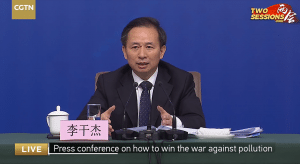
Li Ganjie, China’s minister of environmental protection
China’s top environmental official has quantified the reduction in scrap materials flowing into the country as a result of recent restrictions. He also spoke publicly about the market fallout and the criticism China has received for enacting its reforms.
Li Ganjie, China’s minister of environmental protection, said imports of solid waste, which is usually understood to refer to scrap and waste materials, dropped by 12 percent in 2017. He offered the figure during a March 17 press conference held in conjunction with the 13th National People’s Congress. It’s the latest figure charting the global scrap movement shift away from China. It follows data released in January that shows Southeast Asian countries have boosted their imports in response.
During the Congress, officials also announced a number of government department consolidations. Among them, the Ministry of Environmental Protection (MEP) will be overhauled and rolled into a new, larger Ministry of Ecological Environment. Li will head the new department, which will perform not only the current MEP functions but also those of six other departments.
In addition to quantifying the drop, Li provided a government perspective of how the country got to the point of banning certain scrap imports.
“China’s importing of solid waste started from the 1980s,” Li said through a CCTV translator. “At the beginning, the volume was not too large.”
In the 1990s, however, it began to increase substantially. Some 20 years ago, scrap imports into China hit 4.5 million metric tons, Li stated. A decade later, they had skyrocketed to 45 million metric tons.
Although the material was a valuable resource as a feedstock for manufacturing, Li described “many prominent problems” that emerged as the imports continued. The shipments contained contamination and prohibited materials. China is a member of the Basel Convention, which means it has rights and obligations to prevent the import of certain hazardous materials and other types of waste. However, “due to lack of control, a large amount of prohibited wastes have been imported,” Li said.
The country in 2017 ramped up inspections of recycling facilities to check for environmental compliance. Out of 1,792 companies inspected in July 2017, roughly 60 percent of them had pollution violations, Li said.
Last year also brought a sharp increase in imports for the first six months of the year, Li said, which pushed the country further toward its decision in July to ban certain types of scrap materials.
“Due to various reasons, including the improvement of the market, some enterprises (took) the so-called ‘opportunity’ to import foreign wastes, so there was an increased volume of foreign wastes,” he explained. “In the second half of last year, we’ve adopted plans to control this, and yielded obvious results. In the future, we will keep this momentum and keep maintaining the favorable environment.”
The ban is an aim to greatly reduce the volume of imported materials, Li said. It is “of great significance and necessity, and is fully reasonable,” he said. “As we’re the Ministry of Environmental Protection, we will fully uphold the spirit of the Central Committee. And we’ve yielded relatively good results.”
Global fallout
At the press conference, a reporter asked Li to share his assessment of the worldwide effects of the ban, and whether there will be follow-up measures.
“To implement the Central Committee’s policies timely … some policies are implemented in a short period,” he said. “It may result in chaos in society.”
Li added that in his opinion, some of the voices that have been critical of the Chinese policies are downplaying their own culpability or responsibility to adjust accordingly.
“During the whole process, we’ve taken multiple problems into consideration,” he said. “And we’ve left the transition time and period before the policy and action plan. For more specific problems, we also timely coordinate with relevant parties and solve it, so there was no great impact.”
“I think now the most important thing is that not only China, but any other foreign country should implement the spirit of the Basel Convention and try to reduce, dispose of and consume the hazardous waste and other garbage they produced, which will be conducive to promoting a global green low-carbon recycling development and building a clean, beautiful world,” Li said.
More stories about Asia
- Study: Pricing opacity hurts recycling in four countries
- Indorama Ventures boosts RPET production
- Study: Tailored changes needed for urban circularity



